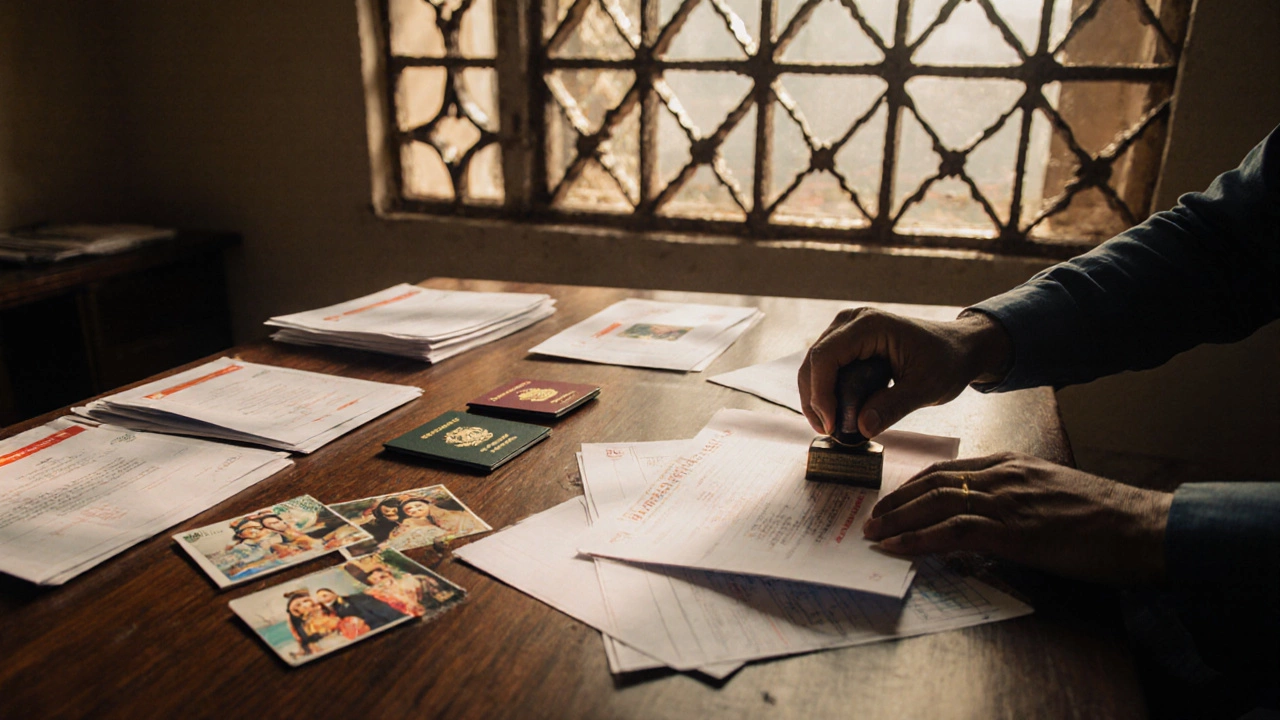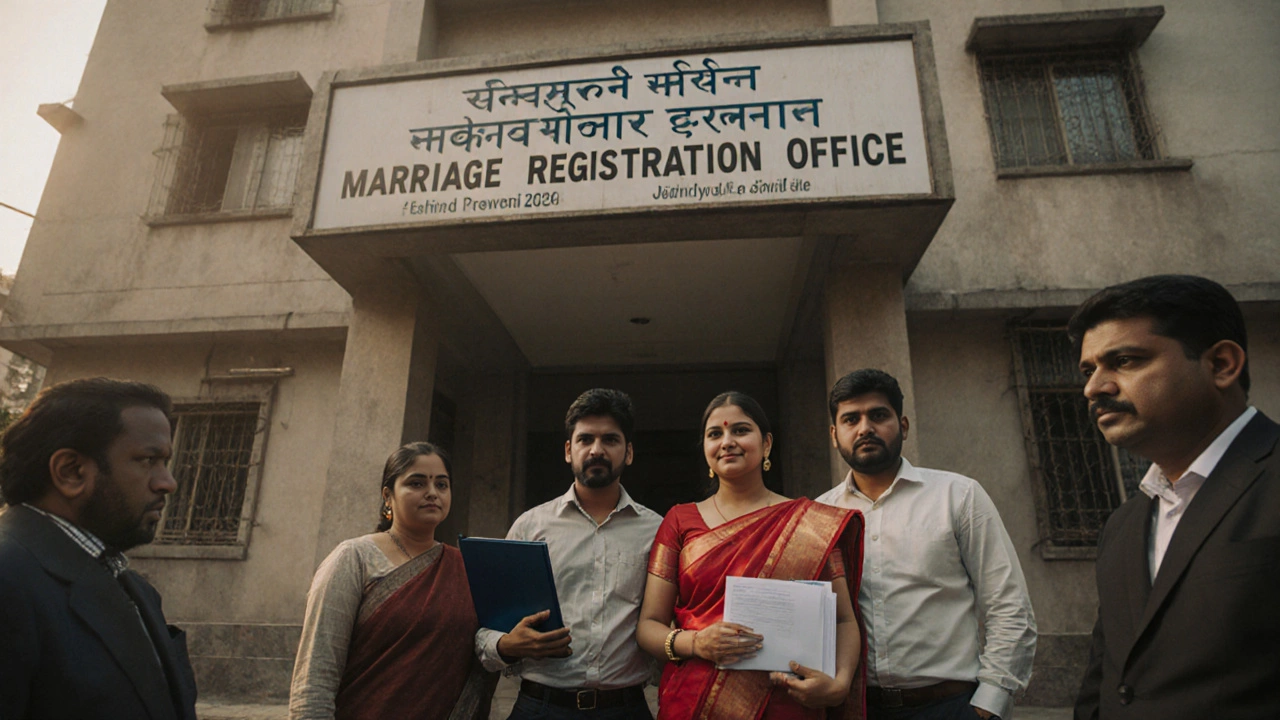Getting married in India isn’t just about the ceremony-it’s about the legal paper that makes it official. Whether you married in a temple, church, or a simple court ceremony, registering your marriage is required by law in most cases. And if you’re planning to apply for a visa, open a joint bank account, or claim inheritance, you’ll need that certificate. But the process can feel confusing, especially if you’re not sure which law applies to you. Here’s how to do it right in 2025.
Which Law Governs Your Marriage Registration?
India doesn’t have one single marriage law. The law you follow depends on your religion or whether you chose a civil marriage. If you don’t pick one, the default is the Special Marriage Act.
- Hindu Marriage Act, 1955 - Applies if both partners are Hindu, Buddhist, Jain, or Sikh.
- Special Marriage Act, 1954 - For interfaith couples, atheists, or anyone who wants a civil marriage without religious rituals.
- Parsi Marriage and Divorce Act, 1936 - For Parsi couples.
- Christian Marriage Act, 1872 - For Christians.
- Muslim Personal Law (Shariat) Application Act, 1937 - For Muslims. Registration isn’t mandatory under this law, but many still do it for legal proof.
Most couples today, especially in cities, go with the Special Marriage Act. It’s the most straightforward, doesn’t require religious rituals, and works for all nationalities. If you’re unsure, this is your safest bet.
Step 1: Check Eligibility
Before you start paperwork, make sure you meet the basic requirements:
- Both partners must be at least 21 years old (men) and 18 years old (women).
- Neither person can be already married.
- Both must be mentally fit to consent to marriage.
- You can’t be related in a way that’s prohibited by law (close blood relations).
- At least one partner must have lived in the district where you’re applying for at least 30 days.
If you’re a foreign national, you’ll need a valid visa and proof of residence in India. You can’t register a marriage on a tourist visa.
Step 2: Visit the Marriage Registrar’s Office
You need to go to the office of the Marriage Registrar in the district where either you or your partner has lived for the last 30 days. This could be a Sub-Divisional Magistrate (SDM) office, Municipal Corporation office, or a designated marriage registration center.
Most cities now have online portals for booking appointments. For example:
- Delhi: Delhi Government Marriage Registration Portal
- Mumbai: Mahanagar Seva Kendra
- Bangalore: BBMP Marriage Registration
If your city doesn’t have an online system, just show up early at the registrar’s office. Bring your IDs and proof of address. You’ll be given a form to fill out.
Step 3: Fill Out the Application Form
The form asks for:
- Full names, dates of birth, and addresses of both partners
- Religion and nationality
- Details of your marriage ceremony (date, place, witnesses)
- Names and addresses of three witnesses
You must sign the form in front of the registrar. Both partners and all three witnesses must be present when you submit it.
Step 4: Submit Required Documents
You’ll need these documents:
- Proof of age - Birth certificate, school leaving certificate, or passport.
- Proof of address - Voter ID, Aadhaar card, utility bill, or rental agreement.
- Passport-sized photos - Usually 3-4 of each person.
- Marriage invitation card (optional, but recommended).
- Divorce decree or death certificate - If either partner was married before.
- Witness documents - ID proof of all three witnesses (Aadhaar, passport, or voter ID).
- Foreign nationals - Valid visa, residence proof, and a No Objection Certificate (NOC) from their embassy.
Make sure all documents are original and carry two photocopies each. The registrar will verify them and return the originals.

Step 5: Wait for the 30-Day Notice Period
After submission, there’s a mandatory 30-day waiting period. This is not a delay-it’s a legal requirement. During this time, the registrar will display your notice publicly (usually on a notice board at the office). Anyone can object to the marriage if they believe it’s illegal.
If no objections are filed, you’re cleared to proceed. If someone does object, the registrar will investigate. Most objections are dismissed if they’re baseless.
Step 6: Attend the Registration Ceremony
On the 30th day (or after), you and your witnesses must appear again at the registrar’s office. You’ll be asked a few simple questions to confirm your consent:
- Do you voluntarily wish to marry each other?
- Are you aware of the legal consequences of this marriage?
You’ll sign the marriage register in front of the registrar and your witnesses. The registrar will then issue a Marriage Certificate on the spot. This is your legal proof.
Step 7: Get Your Certified Copy
The certificate you get on the day is usually a plain copy. If you need an official, stamped, certified copy for visa applications or legal use, you’ll have to request it later.
You can apply for a certified copy:
- At the same registrar’s office, usually within 7-10 days.
- Online through your state’s marriage registration portal.
- By paying a small fee (₹10-₹50, depending on the state).
Keep at least three certified copies. You’ll need them for passports, visas, bank accounts, property transfers, and even school admissions for future children.
How Long Does It Take?
From start to finish, the process takes about 30-45 days if everything goes smoothly. Delays happen if:
- Documents are incomplete or unclear.
- There’s an objection you need to respond to.
- The registrar is overloaded (common in big cities).
Some states now offer expedited services for an extra fee. For example, in Delhi, you can pay ₹500 extra to get your certificate in 15 days instead of 30.

What If You Already Got Married and Didn’t Register?
You can still register your marriage retroactively. The process is the same, but you’ll need to explain why you didn’t register earlier. You’ll still need the 30-day notice period and witnesses. The certificate will show the actual date of your marriage, not the registration date.
Common Mistakes to Avoid
- Using expired ID documents - Make sure your Aadhaar, passport, or voter ID is current.
- Forgetting witnesses - You need three, not two. One can be a family member, but they must carry valid ID.
- Applying in the wrong district - You must apply where at least one partner has lived for 30 days.
- Not keeping copies - Always get certified copies right away. Reapplying later is a hassle.
- Assuming religious marriage = legal marriage - A temple or church ceremony alone doesn’t make it legal in India unless it’s registered.
What’s the Cost?
Fees vary by state and law:
- Special Marriage Act: ₹100-₹150 (registration fee)
- Hindu Marriage Act: ₹50-₹100 (varies by state)
- Certified copy: ₹10-₹50
- Expedited service: ₹500 (in some cities)
There are no hidden fees if you go through the official route. Watch out for agents offering to "speed up" your registration-they often charge hundreds of rupees for nothing.
Can Foreigners Register Their Marriage in India?
Yes. If you’re a foreign citizen marrying an Indian, you can register under the Special Marriage Act. You’ll need:
- A valid visa (not tourist)
- Proof of residence in India for at least 30 days
- A No Objection Certificate (NOC) from your country’s embassy in India
- Your passport and birth certificate (translated into English if needed)
Some embassies require you to register your marriage with them too. Check with your embassy before starting the Indian process.
Why Register at All?
Without a marriage certificate, you’re legally invisible as a couple. You won’t be able to:
- Apply for a spouse visa or permanent residency.
- Claim insurance or pension benefits.
- Transfer property or inherit assets.
- Get your spouse’s name on a passport or bank account.
- File joint tax returns.
- Seek legal protection in case of separation or abuse.
It’s not just paperwork. It’s your legal safety net.
Can I register my marriage online in India?
Yes, in most major cities. States like Delhi, Maharashtra, Karnataka, and Tamil Nadu have online portals where you can book appointments, upload documents, and track your application. But you still need to appear in person for the 30-day notice verification and final registration. Online systems simplify the process but don’t eliminate the physical steps.
Is a marriage certificate required for a visa?
Absolutely. If you’re applying for a spouse visa to live in another country, the embassy will demand a certified marriage certificate issued by the Indian registrar. A wedding photo or religious certificate won’t be accepted. Always get an official copy with the registrar’s stamp and signature.
Can I register my marriage if I’m under 18?
No. The legal age for marriage in India is 21 for men and 18 for women. Even if your family or religion allows early marriage, the registrar will refuse to register it. Any marriage below these ages is illegal under Indian law and can be annulled.
What if my partner is from a different religion?
You must register under the Special Marriage Act. This law allows interfaith and inter-caste marriages without requiring either party to convert. The process is the same as for any other couple, and the certificate doesn’t mention religion. It’s the most neutral and widely accepted option.
Do I need a lawyer to register my marriage?
No. The process is designed to be done without legal help. All you need is the right documents, three witnesses, and patience. Lawyers are only necessary if there’s an objection, a dispute over documents, or if you’re a foreigner dealing with embassy requirements. For most couples, it’s a simple administrative step.
How long is a marriage certificate valid?
It’s valid forever. Once issued, your marriage certificate doesn’t expire. You don’t need to renew it. Keep it safe-it’s a lifelong legal document. If you lose it, you can always get a certified duplicate from the registrar’s office.
